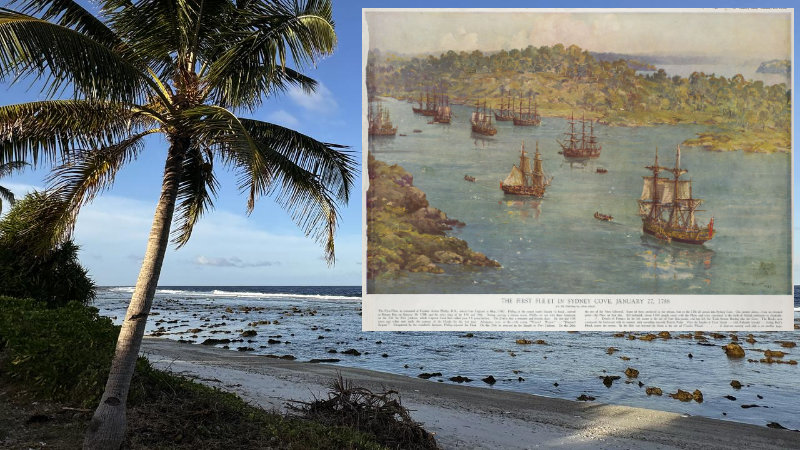Australia’s deal to deport hundreds of refugees to Nauru will cost billions and further damage our already tattered reputation as a defender of human rights. Allison Battisson reports with Janet Pelly.
Around 250 years ago, my ancestors were banished from England to the remote Pacific island penal colony of Norfolk Island. Life on the island was harsh, and my ancestors died young of disease and deprivation – the island was never a viable option for permanent settlement.
My ancestors were chosen for deportation from amongst the criminal masses because they were poor, disenfranchised and in many cases, not English (they were Irish). They had no voice in Parliament. Just like the people now impacted by Australia’s deal with Nauru to take non-citizens deemed too undesirable to remain in Australia.
These people cannot vote, and their lack of voting power is reflected in how both the Liberal and Labor parties treat them – as if they can be thrown away, just like my ancestors were.
Putting this in context, when deportation for criminal offending from England was legal,
so too was slavery, the death penalty and child marriage for girls at 12 years of age.
The speed and secrecy surrounding Australia’s Nauru deal have robbed us all of an opportunity to properly weigh its profound consequences. To properly understand what it means for the people it is impacting, and for Australians.
The latest deal with Nauru serves to exile from Australia people who have nowhere else to go. They are in Australia because they are stateless or refugees. The Australian Government targets them for removal to Nauru because we can no longer indefinitely detain them following the High Court’s decision in NZYQ in November 2023.
Instead, the Government’s solution is to send them to one of the smallest and poorest islands in the Pacific.
Twenty-four years after the Pacific Solution was announced, last week’s discovery of a new deal and amendments to the Migration Act 1958 (Cth) establishes a new offshore detention regime: one that places human beings under contract, shields their treatment from Australian courts, and rips families apart permanently.
A false narrative
The political narrative about the people in the NZYQ cohort overlooks several facts.
First, they were indefinitely detained in prison conditions because they couldn’t be returned to their country of origin, not because of the severity of their crime. I have clients facing exile to Nauru who have never offended or have committed non-violent property offences.
Many committed offences when they were young – they are now older and have been rehabilitated. All have served their prison terms, and many last offended more than a decade ago.
Second, a significant number grew up in Australia – many of my clients have Australian accents – raising the question of what responsibility we bear for people who, while not citizens, have spent most of their lives within our communities. To export them now is to deny any duty of care to those shaped by Australian society, even as they are excluded from its protections.
Finally, it is dishonest to suggest that this cohort represents an unmanageable danger. Otherwise, we wouldn’t be sending them to an island the size of Melbourne airport, population 12,000.
Those who have been in prison have served their time, plus years in immigration detention, often much longer than their criminal sentences. My clients live with chronic trauma, illness or disability, exacerbated by the endless nature of their detention and punishment through a never-ending migration process,
where the goal posts constantly change and a permanent home is never guaranteed.
Follow the money
The reality is that Australia has entered into a binding, decades-long arrangement, and the $2.5 billion price tag is only the most visible cost. With interest, Nauru stands to make more than $7 billion from the arrangement.
Less visible, but more corrosive, is the damage done to our democracy when secrecy is used to avoid scrutiny. The public still doesn’t have access to the Memorandum of Understanding (MoU) underpinning this arrangement, despite it costing the Australian taxpayer billions. Both the Labor and Liberal parties supported the decision not to publicly release the MoU.
Companies and individuals are going to make fortunes based on this secret deal.
If Australia can remove people from its jurisdiction whenever a court decision becomes politically inconvenient, then the very idea of the rule of law is weakened. The High Court has already ruled that indefinite detention is unlawful. Offshore exile, purchased with billions, is little more than an attempt to sidestep that ruling while pretending compliance.
The reality is that these people will likely never be able to leave the island. They have no right to travel documents, so while their Nauru visa may allow exit and re-entry, in practice, they can’t exercise this right.
If public safety is threatened, there are options that are entirely within Australia’s capability, just like there are for citizens who have been through the justice system.
Mistreating our neighbours
Our Pacific neighbours are not utilities, but partners deserving of proper consideration. Turning Nauru into a penal colony sends a deeply disturbing signal to the region—and to the world. Our Asian Pacific neighbours have already raised concerns, including the Malaysian Government, which has announced it will seek to discuss its concerns with Australia this week.
It also raises a question of whether Australians will
accept a future where human beings can be stripped of rights, shipped offshore, and forgotten.
The NZYQ group is just the first test. It sets a precedent where residency, roots, and relationships in Australia count for nothing if the government decides someone no longer belongs. What begins with this group of people today could, in time, extend far wider.
We face a choice. We can entrench a policy of exile and dependency, or we can chart a different course.
To start with, we can stop the secrecy surrounding the Nauru deal and build partnerships with our Pacific neighbours based on mutual respect, not monetary coercion.
Australia’s reputation as a fair and just nation depends on whether we meet this moment with integrity or with fear. By rejecting an island prison paradigm, we see real people and real families and start to consider real, sustainable solutions.
Our government is withholding access to the MoU, when parliamentary, judicial and legal scrutiny is both reasonable and sorely needed.
The proposed return to an island prison paradigm is morally bankrupt, whether it’s Australian territory or another nation’s.
Asylum seekers’ frustration mounts, pressure on Australia to act.


